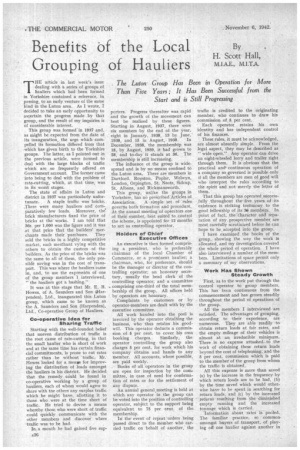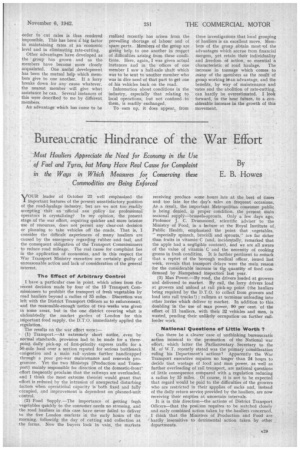Benefits of the Local Grouping of Hauliers
Page 28

Page 31

If you've noticed an error in this article please click here to report it so we can fix it.
By H. Scott Hall,
M.1.A.E., M.I.TA.
THE article in last week's issue dealing with ti series of groups of hauliers which had been formed in Yorkshire contained a reference, in passing, to an early venture of the same kind in the Luton area. As I wrote, I decided to take an early opportunity to ascertain the progress made by that group, and the result of my inquiries is of considerable interest.
This group was formed'in 1937 and, as might he expected from the date of its inauguration, the urge which compelled its formation differed from that which has given birth to the Yorkshire groups. 'I he latter, as I pointed out in the previous article, were formed to deal with the large blocks of traffic which are so frequently offered on Government account. The former came into being to deal with the problem of rate-cutting, which, at that time, was in its worst stages.
The state of affairs in Luton and district in 1937 was particularly unfor tunate. A staple traffic was bricks. .There were many hauliers and comparatively few loads. Moreover, the' brick manufacturers fixed the price of bricks at the works. I am told that 36s. per 1,000 was the figure and it was at that price that the builders' merchants made their purchases. They sold the bricks in a highly competitive market, each merthant vying with the others to obtain the custom of the builders. As the price of the bricks was the same to all of them, the only possible saving was in the cost of transport. This was where the hauliers came in, and, to use the expression of one of the group members I interviewed, " the hauliers got a bashing."
It was at this stage that Mr. E. B. Howes, of A. Saunders and Son (filiarpenden), Ltd., inaugurated this Luton group, which came to be known as the A, Saunders and Son (Harpenden). Ltd., Co-operative Group of Hauliers.
Co-operative Idea for
Sharing Traffic
Starting with the well-founded belief that uneven distribution of traffic is the root cause of rate-cutting, in that the small haulier who is short of work and at the same time has certain financial commitments, is prone to cut rates rather than be without 'traffic, Mr. Howes looked for a memos for improving the distribution of loads amongst the hauliers•in his district. He decided that the remedy could be found in co-operative working by a group of hauliers, each of whom would agree to share with the others any surplus traffic which he might have, allotting it to those who were at the time short of traffic. He tried to devise a means whereby those. who were short of traffic could quickly communicate with the other members and discover where .traffic was to be had.
In a month he had gained five sup
porters. Progress thereafter was rapid and the growth of the movement can hest be realized by these figures. Starting in August, 1937, there were six members by the end of the year, eight in January, 1938, 13 by June,' 1938, and .15 in August,. 1938. In December, 1938, the membership was 18, by August, 1939, it had grown to 28, and to-day it stands at 36. The membership is still increasing.
The influence ot the group is widespread and is by no means confined to the Luton area. There are members in Dartford. Royston, Poplar, Welwyn, London, Orpington, St. Neots, Sidcup, St. Albans, and Rickmansworth.
This group, unlike the groups in Yorkshire, has no prescribed Articles of Association. A simple set of rules governs both formation and procedure. At the annual meeting of operators one of their number, best suited to control the scheme, is appointed for 12 months to act as controlling operator.
Holders of Chief Executive Offices
An executive is then formed comprising a president, who is preferably chairman of the local Chamber of Commerce, or a prominent haulier; a chairman, who, for preference, should be the manager or director of the controlling operator; an honorary secretary, usually the head clerk of the controlling operator; and a committee . comprising one-third of the total membership of the group. All offices held by operators are honorary.
Complaints by customers or by operator-members are dealt with by the executive committee.
All work handed into the pool is invoiced by the operator obtaining the business, who thus retains his goodwill, This operator deducts a commission of 6 per cent, to cover his own booking charges. Similarly, the operator controlling the group also charges 5 per cent, for work which his company obtains and hands to any member. All accounts, where possible, are paid weekly.
Books of all operators in the group are open for inspection by the committee, in case of need for confirmation of rates or for the settlement of any dispute.
An annual generahmeeting is held at which any operator in the group can be voted into the position of controlling operator, subject to the support being equivalent to 75 per cent. of the membership. In the event of repeat orders being passed direct to. the member who carried traffic on behalf of another, the traffic is credited to the originating member, who continues to draw his commission of 5 per cent.
• Each operator retains his own identity and has independent control of his finances.
These rules, it must be acknowledged, are almost absurdly simple. From the legal aspect, they may be described as " wide open." Any operator can drive an eight-wheeled lorry and trailer right through them. It is obvious that the practical an& continuous operation of a company so governed is possible only if all the members are men of good will who interpret the rules according to the spirit and not merhly the letter of them.
That this group has operated successfully throughout the five years of its existence is striking testimony to the good fellowship of its 36 members. In point of fact, the character and reputation of any prospective member are most carefully scrutinized before he can hope to be accepted into the group.
I have examined the hooks of the group,. showing the way the work is allocated, and my investigation covered the whole period of operation. I have also interviewed a number of the members. Limitations of space permit only a summary of my observations.
Work Has Shown
Steady Growth First, as to the work put through the control operator to group members. This has bun continuous from the commencement and has grown steadily throughout the period of operations of the group.
All the members I interviewed are satisfied. The advantages of grouping, according to their experience, are numerous. They are able readily to obtain return loads at fair rates, and the empty mileage of their vehicles is almost at an irreducible minimum. There is no expense attached-to the work of obtaining these return loads beyond the cost of telephoning, and the 5 per cent. commission which is paid • to the member of the group from whom the traffic is obtained.
All this expense is more than saved (a) by the increase in the frequency by which return loads are to be had, (b) by the time saved which would otherwise have to be spent in searching for return loads, and (c) by the increased returns resulting from the diminished empty runriing and the increased tonnage which is carried.
Information about rates is pooled. The familiar practice, so common amongst buyers of transport, of playing off one haulier against another in
order to cut rates is thus rendered impossible. This has been if big factor in maintaining rates at an economic level and in eliminating rate-cutting.
Other advantages have developed as the group has grown and as the members have become more closely acquainted. One useful development has been the mutual help which members give to one another. If a lorry breaks down for any cause whatever, the nearest member will give what assistance he can. Several instances of this were described to me by different members.
An advantage which has come to be
realized recently has arisen from the prevailing shortage of labour and of spare parts. Members of the group are giving help to one another in respect of difficulties arising from these conditions. Here, again, I was given actual instances and in the offices of one• member I saw a half-axle shaft which was to be sent to another member who was in dire need of that part to get one of his vehicles back on the road.
Information about conditions in the industry, especially that relating to local operations, but not confined to them, is readily exchanged.
To sum up, it does appear, from these investigations that local grouping of hauliers is an excellent move. Members of the group obtain most "of the advantages which accrue from financial mergers, yet retain their individuality and .freedom of action, so essential a characteristic of road haulage. The increase in tonnage which comes to many of the members as the restilt of group working loan advantage, and the benefits, by way of maintenance and 'rates and the abolition of rate-cutting, can hardly be overestimated. I look forward, in the near future, to a considerable increase in the growth of this movement.




















































